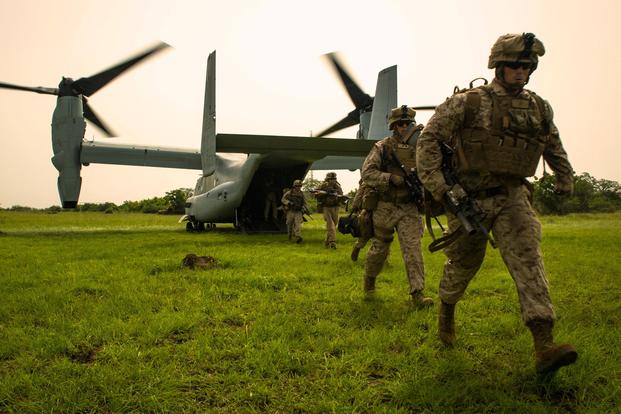Five years after the Marine Corps stood up a new land-based unit to respond to threats at U.S. embassies and other emergencies across Africa, the Pentagon's top watchdog wants to make sure the force has what it takes to carry out its mission.
The Defense Department Inspector General's office announced last week that it will immediately begin evaluating whether Special Purpose Marine Air-Ground Task Force-Crisis Response-Africa can meet its operational requirements. The study comes months after the unit's former commander recommended the land-based force be moved back to Navy ships.
The task force, which was created after the deadly 2012 attack on a diplomatic facility in Benghazi, Libya, was meant to fill a gap since budget cuts left the Navy and Marine Corps without enough amphibious assault ships to regularly patrol the Mediterranean Sea. But the special-purpose unit was "not designed to be something in perpetuity," said Col. Sean Salene, who led the response force for seven months last year.
"Re-establishing that presence in the Mediterranean as a more capable, larger-capacity force, we think would work better to meet all the demands that are out there," Salene said in November. He has since been nominated for promotion to one-star.
The Marine Corps declined to comment on the inspector general's study since it's ongoing. But the service fully cooperates with all DoD inspections and evaluations, said Capt. Karoline Foote, a Marine spokeswoman at the Pentagon.
"Special Purpose Marine Air-Ground Task Force-Crisis Response-Africa is uniquely tailored to meet the demands of the mission to which it is assigned," Foote added. "... The flexible, expeditionary nature of this SPMAGTF makes it uniquely qualified to respond to a litany of mission sets, crises and limited contingencies in the absence of an amphibious ready group with an embarked Marine expeditionary unit."
The unit, which includes about 1,000 Marines and sailors based in Spain and Italy, first deployed in 2013 -- about eight months after the attack in Benghazi left four Americans dead, including Ambassador J. Christopher Stevens. In that incident, nearly 24 hours passed before any U.S. troops arrived in Libya to reinforce security, which led to harsh criticism of the response by the State Department and Pentagon.
Since then, the Marines with the crisis-response unit have evacuated State Department personnel from several diplomatic posts under duress, including from South Sudan and Libya in 2014.
Since most of the unit is based in Europe, though, reaching some areas on the vast African continent can be difficult. The Marines conducting the 2014 evacuation mission in South Sudan flew MV-22B Ospreys more than 4,000 miles from Spain to Juba, requiring mid-flight refueling from a KC-130 Super Hercules.
As the fight against the Islamic State has kicked up, both of those aircraft have been in high demand. The Marine Corps has stood up two more land-based crisis-response units: one that operates year-round in the Middle East and one that heads to Central America during hurricane season. Last year, the crisis response force for Africa saw its number of Ospreys and C-130s slashed in half, leaving it with six MV-22Bs and three transport tankers.
That, said Col. Martin Wetterauer -- another of the unit's former commanders, wouldn't change the Marines' ability to conduct their mission in Africa, but it would prevent them from carrying out multiple operations at once.
Operating from the sea as a MEU also removes the need for permission from partner nations to use airspace or stage gear on the ground for future missions, Salene added.
While conducting its evaluation, the inspector general's team plans to speak to the defense secretary's office for policy, the Joint Staff, Marine Corps headquarters, U.S. Africa Command, Marine Corps Forces Africa, personnel with Special Purpose Air-Ground Task Force-Crisis Response-Africa and others, according to a notice about its study. No timeline was given as to when the evaluation will wrap up.
Foote said the Marine crisis response force is designed to be expedient while still providing significant capabilities for crisis situations and other theater-security cooperation efforts in Africa.
"Its highly mobile organization allows the MAGTF to conduct limited crisis and contingency response operations to safeguard U.S. citizens and interests in the U.S. Africa Command area of responsibility," she said.
-- Military.com's Hope Hodge Seck contributed to this report.
-- Gina Harkins can be reached at gina.harkins@military.com. Follow her on Twitter at @ginaaharkins.











